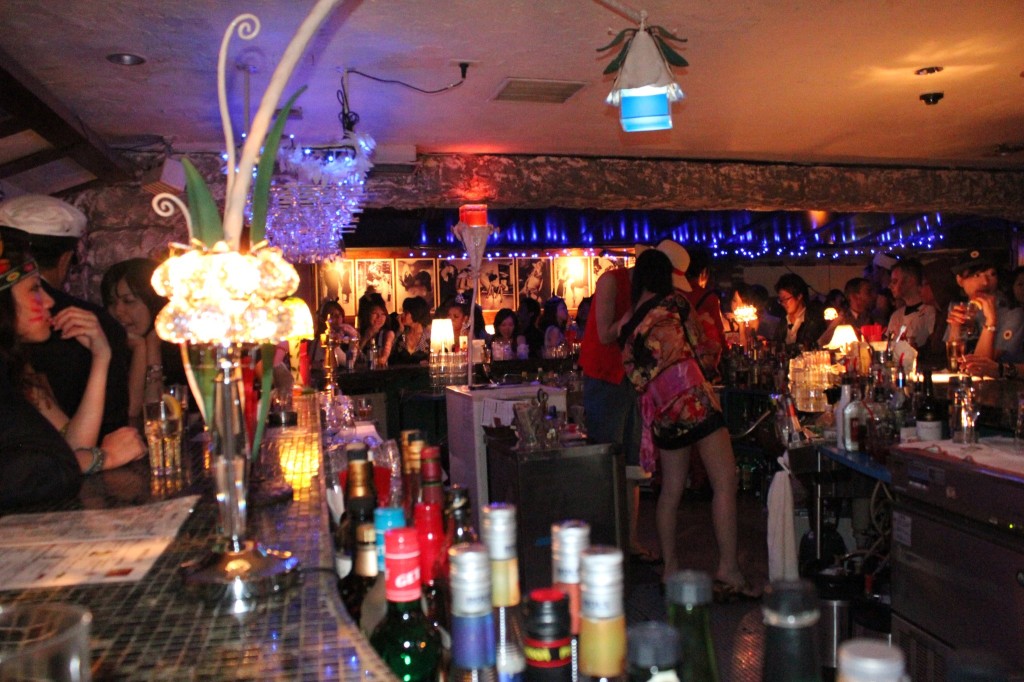Roppongi’s iconic dance club, Muse (ミューズ), became the latest victim of the crackdown on illegal dancing–the so-called “War on Dance”— when police announced on Sunday morning that it had raided the club and arrested manager Yuki Takano (37), a disk jockey, and two DJs. Their crime: setting up a DJ booth, playing music, and allowing the customers to dance. The police are also looking into other clubs allegedly run by the group including a so-called “girl’s bar”* in the neighborhood, to see if those establishments were also involved in other heinous illegal activity, such as customers sitting with the female bartenders behind the bar counter..

The arrests are in violation of the Entertainment Business Control and Improvement Law (風営法, a set of archaic rules created in 1948, which prohibit dancing after midnight. The law had been gathering dust in the books for years, until the Osaka police began enforcing it rigidly in 2012. In Tokyo, when a man was beaten to death last year at Club Flower in Roppongi, the Tokyo Metropolitan Police Department also began to aggressively apply the laws, making raid after raid. Since then, the police have been cleaning up the area and arresting the club owners violating the law. Muse is only the latest in a long string of clubs that have been busted this year for illegal dancing. In July the police raided the infamous Gas Panic nightclub and arrested the manager and disk jockey for operating without a license. In May, Vanity Lounge, was targeted and three employees were arrested in suspicion for violating the entertainment laws. Vanity reopened under a different name, V2, and labeled itself as a “restaurant”. The crackdowns have taken away much of what had made Roppongi the vibrant nightlife district sandwiched between the gentrified areas of Roppongi Hills and Midtown it had once been. Businesses have taken a hit, including the McDonald’s near the crossing, a meeting place for those who want to line their stomachs with a protective coat of Big Mac grease before a night of heavy drinking or a refuge for those waiting for the first train to arrive.

Although Muse is located only ten minutes away from Roppongi Station, it is known as a far less sleazy venue when compared to its neighbors. **A sign on the doorway requires that visitors, namely males, be between 24 and 39 years old, and have a business card to present to the bouncer. Flip flops, shorts, and gym clothes have no place on the dance floor. And most importantly, servicemen in the military who want to have a bit of fun tonight have to turn back around and head straight back to Gas Panic, because Muse has a strict “no servicemen allowed” rule. These rules filtered out enough of the “riff-raff” that the foreign customers were usually all high-income expats working at foreign companies in Tokyo, or financially savvy and business card holding English teachers. Of course, none of these rules apply to females who are often allowed in without even flashing an ID card. My experience going to Muse was that I was waved inside before I could even reach into my purse to grab my passport. Females don’t even have to dish out the 3000 yen entry charge that males have to pay (Editor’s note: When will the discrimination against men in Japan ever end? This matriarchal society needs to change). This policy balances out the male to female ratio, compared to other nightclubs. Still, this doesn’t change the fact that Muse was still undeniably a meat market and a popular pickup spot. It’s unknown how long Muse will remain closed or whether it will open in time for Halloween celebration this weekend. But for now, warming up with a couple of cocktails from the nearby Lawson and buying an ice cream cone at Hobson’s before heading into Tokyo’s less sleazy alternative to the clubs in neighboring Roppongi—that is simply out of the question.
*”Girl’s bars” are essentially hostess bars that use a loop hole in the Entertainment Business Control and Improvement Law to operate past midnight. The female bartenders, who often work as hostesses before midnight, sitting next to customers, move to standing bar tending positions and speak with the customers over the bar counter. If the women sit with the customers past midnight, they are in violation of the law.
** (Editor’s note: There have been allegations that females working at MUSE were pressured to date some of the bar’s more wealthy clientele under dubious circumstances. MUSE management was unavailable for comment)